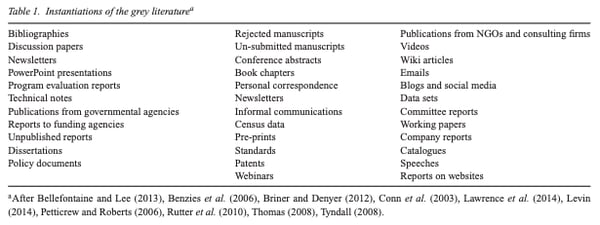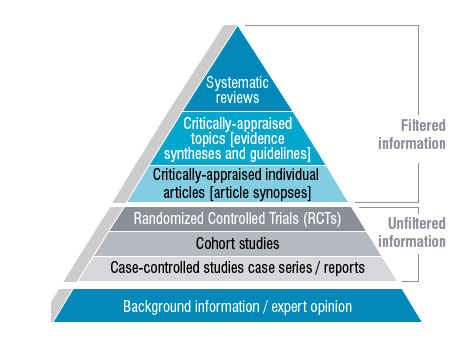Share this
A CILIP webinar explains what grey literature means to info pros
July 1, 2020
Grey literature is hard to categorise, occasionally elusive, and users value it more than we can imagine. So when CILIP announced a webinar presented by The King’s Fund, I jumped at the chance to learn the latest in grey literature management. Although TKF works with health information, the topic of grey literature is relevant to everyone in information management; legal, financial, education, science, etc - and suppliers of current awareness platforms.
Deena Maggs and Kathy Johnson shared some of the what’s and why’s of their experiences with this problematic and ubiquitous mass of material. But first, what is “grey literature”?

How do we define grey material?
Deena and Kathy described it as “material not published in the normal way”. For example the reports that TKF itself produces would be classified as “grey literature”; TKF is not a publisher in the official, traditional sense. To further explain, I found an excellent article which attempts to list the different types of grey material - here is their table for reference:

Deena and Kathy explained that grey literature provenance is important, and their standard of provenance may vary according to what they are using that grey literature for. One librarian says podcasts, vlogs, blogs, Tweets or Facebook postings can be a great place to locate valuable information not found elsewhere. But is social media grey material?
This remains a somewhat ‘grey’ area (sorry). Social media is a perfect example of why librarians are currently attempting to preserve, archive, and manage an unprecedented amount of information. For instance the Library of Congress documented the first 12 years (2006-2017) of Twitter, however in 2018 they decided to acquire tweets on a more selective basis. Official Twitter accounts are one thing, however many personal tweets are definitely more ephemeral in nature.
The AACODS checklist is designed to enable evaluation and critical appraisal of grey literature. The acronym Accuracy, Authority, Coverage, Objectivity, Date, Significance helps information people assess and examine material so that they can decide whether to include it in literature reviews, research packages and whatever else the end-user has requested.
How do we use grey literature?
Finding and making use of grey literature has posed a problem for both information people and end-users for many years. Your end-users are relying on your expertise to find, and ensure its quality. Once information people have ascertained that the documents in their library feeds fulfils the AACODS criteria, it can be used in a couple of ways. Deena and Kathy explained.
- Literature searches: These arise in the general course of library and information business. As the team said, “how wide we cast our net in the sea of grey depends on the nature of the topic and what our user is interested in.”
- Alerting services: Current awareness alerts are predominantly made up of grey literature. This supplements articles from the news and trade press. Then as valuable material is identified, it gets added to the central library database.
This is where the team discussed the need for a content aggregation system to handle grey literature from official and unofficial sources. News monitoring platforms like Vable are designed to handle incoming content in many formats, from RSS feeds, emails and internal documents.
As an aside, we have already noted the ephemeral and transient nature of grey literature on the internet. This means that teams have to monitor web links and ensure material is properly archived. This is standard library and information practice because Library Management Systems, news monitoring platforms, intranets, etc., all rely on active and healthy URLs.
What challenges has COVID-19 posed to health information provision?
COVID-19 has caused an upheaval in health information provision. Although end-users in all professions and industries need current peer reviewed articles by experts, healthcare and medicine is a special area. In these extraordinary circumstances, keeping track of all explanatory “sense making” material, as well as peer reviewed scientific articles, has been overwhelming. It’s also been made more challenging by remote working and ‘a blizzard of information on COVID-19’.
Seeing the bigger picture is crucial to any industry. This is why a broader selection of news and trade press sources have been incorporated into health information provision and their current awareness. Experts need to see issues in their wider context to predict future events. The team reported that this is a relatively new development in health.
Horizon scanning is a process to identify potential trends, opportunities, new technologies or threats that could impact on your area of interest. Identifying these helps teams to plan for the future by taking advantage of such developments or being better prepared for them when they occur.
In health this could be identifying new and emerging medications, technologies or interventions that could be beneficial to your service or change practice and policy. It could be workplace planning or new drug developments. Knowledge for Healthcare
It will be a while before the broader impact of the pandemic on the healthcare systems is understood. In collaboration with the various health and broader social care agencies, they have been contributing to various projects. TKF team has been collating research (including grey literature, published articles etc) on the effects of health emergencies. For instance those caused by terrorist attacks, environmental and natural disasters, as well as the various outbreaks of MERS, SARS, and other epidemics.
Their pages on Leading through COVID is designed to provide support to health and care leaders, whether people are are working in the NHS, social care, public health or the voluntary and independent sector. They review it regularly with user input to ensure it is practical, helpful and works for everyone. .
Appraising resources and recognising experts
The TKF information team is anxious that they maintain quality over quantity by applying strict appraisal criteria to the type of information that they disseminate. The team outlined a number of questions to consider when appraising grey literature and it can be applied to material from:
- Is it associated with a reputable organisation?
- Is it in association with recognised expert, and identified in other sources
- Has it been cited by others?
- Is it representative of work in the field?
- Is it balanced in presentation? Even if it’s an opinion piece.
- Does it enrich or add something unique to the research
- Is there an awareness of bias in the evidence - both positive and negative?
For example in 2007 the sponsors of the UK Association for the Study of Obesity included Coca-Cola and Kellogg’s. For information people at that time, they had to ask how reputable was the literature ASO produced, what sort of message did it send?
As a handy guide for all librarians, information people and researchers, there is a hierarchy of evidence. It encourages you to take a top-down approach to locating the best evidence; you start with the most reliable published material, and if that is not available, you work your way down the pyramid.

As every information person knows, there is more to information than just books and journals, which is why we recommend quality databases, reputable free and premium sources, and large quantities of advanced “judicious Googling.” Information overload isn’t going away anytime soon and we have more information than we can manage. This is apparent when you look at the growing list of information sources.
Listening to this webinar reminded me how important information people are, regardless of industry or specialism. Our mission is to anticipate and supply what the end-user has requested, without preconceptions or prejudice. People's lives and livelihoods can depend on us to work effectively and efficiently within the challenging information ecosystem we inhabit.
Can anyone think of a better term than "grey literature", or is that here to stay?
Share this
- February 2026 (1)
- January 2026 (2)
- December 2025 (2)
- November 2025 (2)
- October 2025 (3)
- September 2025 (2)
- August 2025 (2)
- July 2025 (4)
- June 2025 (3)
- May 2025 (2)
- April 2025 (1)
- March 2025 (1)
- October 2024 (1)
- July 2024 (1)
- June 2024 (2)
- May 2024 (2)
- April 2024 (3)
- March 2024 (3)
- February 2024 (4)
- January 2024 (2)
- December 2023 (1)
- November 2023 (2)
- October 2023 (2)
- September 2023 (1)
- August 2023 (3)
- July 2023 (5)
- June 2023 (2)
- May 2023 (2)
- April 2023 (4)
- March 2023 (1)
- February 2023 (1)
- January 2023 (2)
- November 2022 (2)
- September 2022 (2)
- August 2022 (2)
- July 2022 (1)
- June 2022 (1)
- May 2022 (2)
- April 2022 (3)
- March 2022 (1)
- February 2022 (2)
- December 2021 (2)
- November 2021 (2)
- October 2021 (2)
- September 2021 (2)
- August 2021 (2)
- July 2021 (2)
- June 2021 (2)
- May 2021 (1)
- April 2021 (2)
- March 2021 (1)
- February 2021 (3)
- January 2021 (2)
- November 2020 (3)
- October 2020 (1)
- August 2020 (2)
- July 2020 (4)
- June 2020 (1)
- May 2020 (1)
- April 2020 (2)
- March 2020 (2)
- February 2020 (3)
- January 2020 (1)
- December 2019 (2)
- November 2019 (1)
- October 2019 (1)
- September 2019 (1)
- August 2019 (3)
- July 2019 (3)
- June 2019 (3)
- May 2019 (2)
- April 2019 (1)
- March 2019 (2)
- February 2019 (3)
- January 2019 (3)
- December 2018 (1)
- November 2018 (2)
- October 2018 (2)
- September 2018 (1)
- August 2018 (2)
- July 2018 (1)
- June 2018 (2)
- May 2018 (3)
- April 2018 (3)
- March 2018 (1)
- February 2018 (3)
- January 2018 (1)
- November 2017 (1)
- October 2017 (1)
- July 2017 (1)
- April 2017 (2)
- March 2017 (3)
- February 2017 (1)
- January 2017 (1)
- November 2016 (2)
- October 2016 (1)
- September 2016 (1)
- August 2016 (2)
- June 2016 (1)
- May 2016 (1)
- April 2016 (1)


